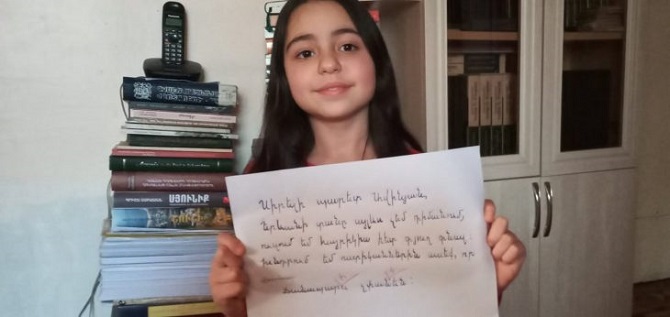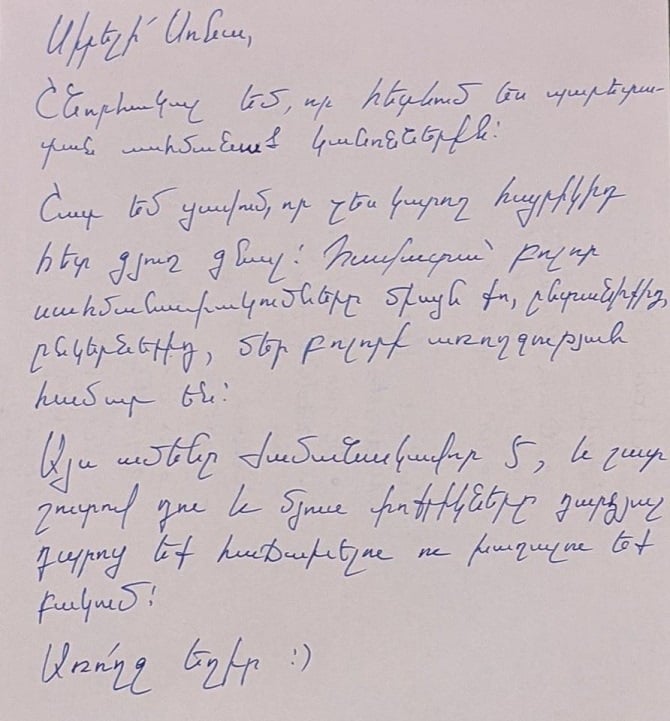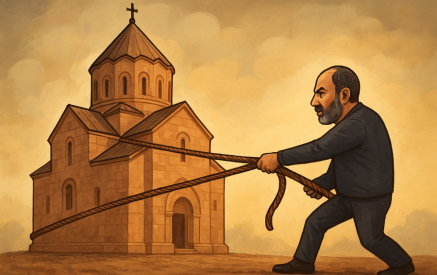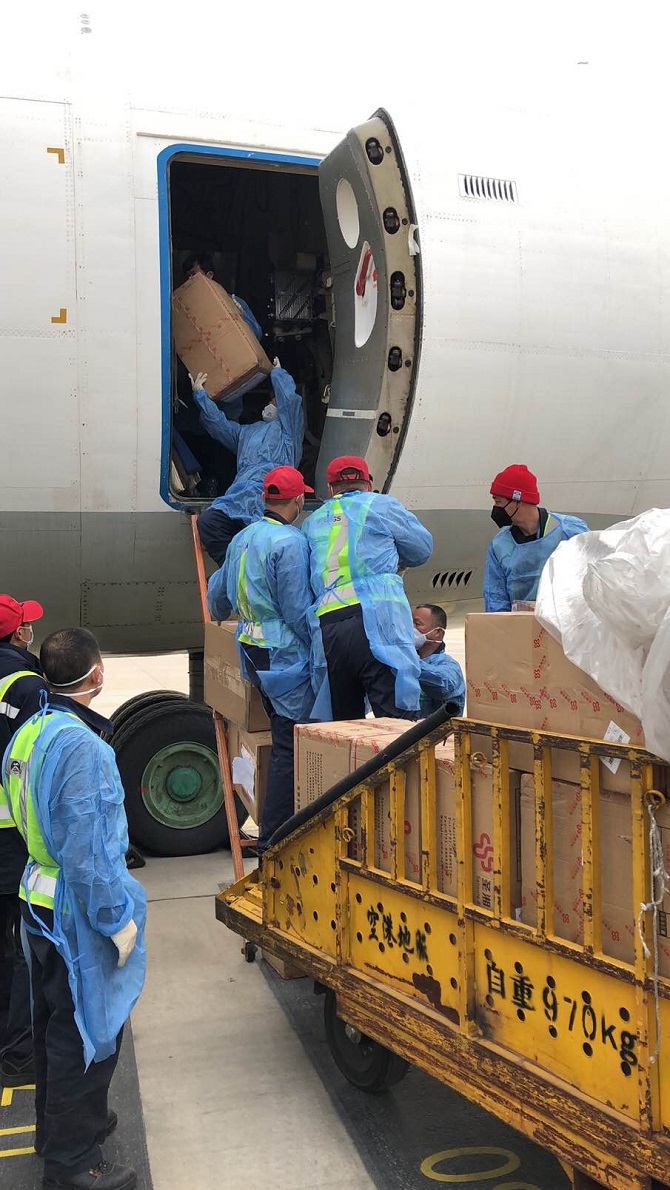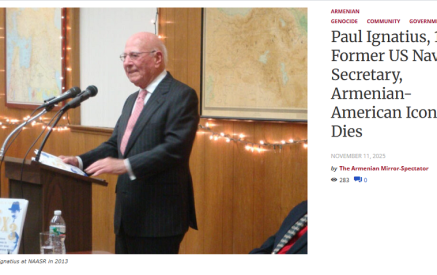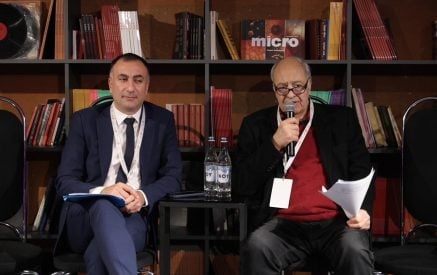ԵՌԱԳՈՅՆ. On April 4, amid another busy day handling the coronavirus crisis, Armenia’s Deputy Prime Minister Tigran Avinyan received a handwritten message. “I can no longer tolerate staying at home in Yerevan. I want to go to the village with my dad. I ask you to tell the police to not block our way,” a student named Sona had written on a piece of paper and held up to the camera.
That morning, 34 new cases of coronavirus infections were confirmed in Armenia, raising the total number of cases to 770. The government had no plans of easing the stringent self-isolation measures the country had adopted. (As of April 7, the confirmed cases have climbed to 853, with eight deaths and 87 fully recovered.) Armenia had extended the stay at home order for another 10 days on April 1.
“Dear Sona,” Avinyan wrote back in Armenian. “I am very sorry that you cannot go to the village with your dad. Believe me, all these restrictions are for your sake, and for the sake of your family, friends and of us all.” The measures are temporary, Avinyan reassured her, and very soon she will once again be able to go to school and play outside.
As soon as reports emerged from China about the spread of the coronavirus, Armenia’s Ministry of Health held discussions about preparedness. Once neighboring Iran confirmed its first cases, a series of possible measures were considered by the Armenian authorities.
Read also
As the World Health Organization (WHO) has continued to issue more restrictive guidelines, Armenia, like all other countries, had to make tough decisions and adopt more restrictive measures.
“In the medical literature, the virus is called the novel coronavirus. There’s so much that’s unknown, and it’s unfair to judge the actions—or inaction—of any government based on a condition that is unknown,” explained Dr. Shant Shekherdimian speaking about the early days of the spread of the virus.
A general surgeon in Los Angeles, California, Dr. Shekherdimian has been involved with public health in Armenia for years and is among the many medical experts advising the Armenian authorities. “A lot of the decisions were based on information that was coming through day by day,” he added. “Perhaps if the government knew a few weeks ago what we know now, they would have acted differently.”
Some have criticized the Armenian authorities for not implementing air traffic and border restrictions fast enough. “WHO was not guiding countries to shut down flights, because they believed that identifying cases and isolation would be sufficient to control the epidemic,” noted Dr. Kim Hekimian in an interview with the Weekly. Hekimian is Assistant Professor of Nutrition (in Pediatrics and in the Institute of Human Nutrition) at Columbia University. She also teaches at the American University of Armenia (AUA) and has been involved in public health issues in Armenia for years.
“It’s hard to say what is right or wrong, but Armenia took the moral high ground on that and was responsible for their citizens and that’s a notable difference,” he added.
That influx continues. Avinyan announced that 222 Armenian citizens arrived from Moscow on April 7, and a second flight is expected to arrive soon. All passengers are quarantined upon their arrival at Zvartnots International Airport for 14 days.
In response to the need for medical supplies and Personal Protective Equipment (PPE), Avinyan announced on April 8 the arrival of a shipment of supplies from China that included 120 ventilators, 60,000 test kits and 60,000 face masks.
The Role of the Diaspora
Dr. Shekherdimian speaks highly of the Armenian government’s transparency and openness to work with the diaspora and also points to the positive role played by the Diaspora High Commissioner’s Office.
Hekimian agrees. “As soon as the first case was confirmed in Armenia there was a discussion about coordinating with infectious disease doctors and public health experts in the diaspora.”
Still, Shekherdimian explains, “We still don’t have a good way of talking to each other in the diaspora and talking with our colleagues in Armenia. The Diaspora High Commissioner’s Office has been a welcomed conduit for two-way discussions. There are a lot of opportunities for improvement.”
Hekimian and Shekherdimian have co-organized a series of conferences in recent years on public health in Armenia and the role of the diaspora. They see a lot of room for improvement in the way in which the diaspora can coordinate its efforts and assist in capacity building in Armenia.
Hekimian explains that there are several ways in which the diaspora can assist Armenia: immediate supply procurement, financial assistance to families and small businesses impacted by the economic disruption, and “the strengthening of the healthcare system so that we can be even better prepared for the longer-term consequences of the coronavirus, and the next pandemic.”
She emphasizes that the diaspora needs to help with Armenia’s healthcare needs more effectively, aligning its resources with the policies and needs that are determined by stakeholders in Armenia and not simply by the agenda of diasporan donors. “On the longer term, it is important that we move away from humanitarian assistance and focus on institutional capacity building and on medical education,” says Hekimian.
She asks, “In the post-coronavirus era, will we revert back to uncoordinated, donor-agenda related projects of humanitarian assistance that are not building capacity? Or will we move towards implementing projects that are sustainable and impactful beyond the donor timeframe?”
Shekherdimian also points to the fact that “our comfort zone has been doing humanitarian work and not system-strengthening work.” And while in this particular situation the humanitarian-type work has a role—there’s a need for masks and ventilators—the diaspora was never well-positioned to also contribute to helping Armenia prepare for this situation.
He concludes, “It remains to be determined if six months down the line, we are going to use this as a wakeup call and say, okay, let’s regroup, let’s see what the resources are available in the diaspora and prepare for the next one.”
Helpful resources and statistics:
Armenia’s Ministry of Health: www.moh.am
Armenia’s National Center for Disease Control: https://ncdc.am/
Armenian Unified Info center: https://www.facebook.com/ArmenianUnifiedInfoCenter/



















































